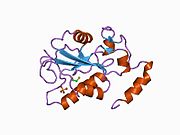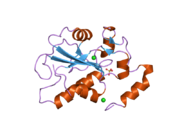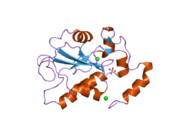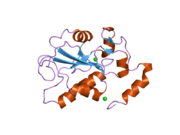CDC25B
M-phase inducer phosphatase 2 is an enzyme that in humans is encoded by the CDC25B gene.[5]
CDC25B is a member of the CDC25 family of phosphatases. CDC25B activates the cyclin dependent kinase CDC2 by removing two phosphate groups and it is required for entry into mitosis. CDC25B shuttles between the nucleus and the cytoplasm due to nuclear localization and nuclear export signals. The protein is nuclear in the M and G1 phases of the cell cycle and moves to the cytoplasm during S and G2. CDC25B has oncogenic properties, although its role in tumor formation has not been determined. Multiple transcript variants for this gene exist.[6]
Interactions
[edit]CDC25B has been shown to interact with MAPK14,[7] Casein kinase 2, alpha 1,[8] CHEK1,[9] MELK,[10] Estrogen receptor alpha,[11] YWHAB,[12][13] YWHAZ,[12] YWHAH[12] and YWHAE.[12][13]
References
[edit]- ^ a b c GRCh38: Ensembl release 89: ENSG00000101224 – Ensembl, May 2017
- ^ a b c GRCm38: Ensembl release 89: ENSMUSG00000027330 – Ensembl, May 2017
- ^ "Human PubMed Reference:". National Center for Biotechnology Information, U.S. National Library of Medicine.
- ^ "Mouse PubMed Reference:". National Center for Biotechnology Information, U.S. National Library of Medicine.
- ^ Galaktionov K, Beach D (February 1992). "Specific activation of cdc25 tyrosine phosphatases by B-type cyclins: evidence for multiple roles of mitotic cyclins". Cell. 67 (6): 1181–94. doi:10.1016/0092-8674(91)90294-9. PMID 1836978. S2CID 9659637.
- ^ "Entrez Gene: CDC25B cell division cycle 25 homolog B (S. pombe)".
- ^ Bulavin DV, Higashimoto Y, Popoff I J, Gaarde W A, Basrur V, Potapova O, Appella E, Fornace A J (May 2001). "Initiation of a G2/M checkpoint after ultraviolet radiation requires p38 kinase". Nature. 411 (6833): 102–7. doi:10.1038/35075107. ISSN 0028-0836. PMID 11333986. S2CID 4410763.
- ^ Theis-Febvre N, Filhol Odile, Froment Carine, Cazales Martine, Cochet Claude, Monsarrat Bernard, Ducommun Bernard, Baldin Véronique (January 2003). "Protein kinase CK2 regulates CDC25B phosphatase activity". Oncogene. 22 (2): 220–32. doi:10.1038/sj.onc.1206107. ISSN 0950-9232. PMID 12527891. S2CID 11296989.
- ^ Sanchez Y, Wong C, Thoma R S, Richman R, Wu Z, Piwnica-Worms H, Elledge S J (September 1997). "Conservation of the Chk1 checkpoint pathway in mammals: linkage of DNA damage to Cdk regulation through Cdc25". Science. 277 (5331): 1497–501. doi:10.1126/science.277.5331.1497. ISSN 0036-8075. PMID 9278511.
- ^ Davezac N, Baldin Véronique, Blot Joëlle, Ducommun Bernard, Tassan Jean-Pierre (October 2002). "Human pEg3 kinase associates with and phosphorylates CDC25B phosphatase: a potential role for pEg3 in cell cycle regulation". Oncogene. 21 (50): 7630–41. doi:10.1038/sj.onc.1205870. ISSN 0950-9232. PMID 12400006. S2CID 20678893.
- ^ Ma ZQ, Liu Z, Ngan E S, Tsai S Y (December 2001). "Cdc25B Functions as a Novel Coactivator for the Steroid Receptors". Mol. Cell. Biol. 21 (23): 8056–67. doi:10.1128/MCB.21.23.8056-8067.2001. ISSN 0270-7306. PMC 99972. PMID 11689696.
- ^ a b c d Mils V, Baldin V, Goubin F, Pinta I, Papin C, Waye M, Eychene A, Ducommun B (March 2000). "Specific interaction between 14-3-3 isoforms and the human CDC25B phosphatase". Oncogene. 19 (10): 1257–65. doi:10.1038/sj.onc.1203419. ISSN 0950-9232. PMID 10713667. S2CID 5816838.
- ^ a b Conklin DS, Galaktionov K, Beach D (August 1995). "14-3-3 proteins associate with cdc25 phosphatases". Proc. Natl. Acad. Sci. U.S.A. 92 (17): 7892–6. Bibcode:1995PNAS...92.7892C. doi:10.1073/pnas.92.17.7892. ISSN 0027-8424. PMC 41252. PMID 7644510.
Further reading
[edit]- Draetta G, Eckstein J (1997). "Cdc25 protein phosphatases in cell proliferation". Biochim. Biophys. Acta. 1332 (2): M53–63. doi:10.1016/S0304-419X(96)00049-2. PMID 9141461.
- Nilsson I, Hoffmann I (2000). "Cell cycle regulation by the Cdc25 phosphatase family". Progress in Cell Cycle Research. Vol. 4. pp. 107–14. doi:10.1007/978-1-4615-4253-7_10. ISBN 978-1-4613-6909-7. PMID 10740819.
- Nagata A, Igarashi M, Jinno S, et al. (1992). "An additional homolog of the fission yeast cdc25+ gene occurs in humans and is highly expressed in some cancer cells". New Biol. 3 (10): 959–68. PMID 1662986.
- Conklin DS, Galaktionov K, Beach D (1995). "14-3-3 proteins associate with cdc25 phosphatases". Proc. Natl. Acad. Sci. U.S.A. 92 (17): 7892–6. Bibcode:1995PNAS...92.7892C. doi:10.1073/pnas.92.17.7892. PMC 41252. PMID 7644510.
- Galaktionov K, Lee AK, Eckstein J, et al. (1995). "CDC25 phosphatases as potential human oncogenes". Science. 269 (5230): 1575–7. Bibcode:1995Sci...269.1575G. doi:10.1126/science.7667636. PMID 7667636.
- Demetrick DJ, Beach DH (1994). "Chromosome mapping of human CDC25A and CDC25B phosphatases". Genomics. 18 (1): 144–7. doi:10.1006/geno.1993.1440. PMID 8276402.
- Honda R, Ohba Y, Nagata A, et al. (1993). "Dephosphorylation of human p34cdc2 kinase on both Thr-14 and Tyr-15 by human cdc25B phosphatase". FEBS Lett. 318 (3): 331–4. doi:10.1016/0014-5793(93)80540-B. PMID 8440392. S2CID 30754963.
- Lane SA, Baker E, Sutherland GR, et al. (1993). "The human cell cycle gene CDC25B is located at 20p13". Genomics. 15 (3): 693–4. doi:10.1006/geno.1993.1129. PMID 8468065.
- Baldin V, Cans C, Superti-Furga G, Ducommun B (1997). "Alternative splicing of the human CDC25B tyrosine phosphatase. Possible implications for growth control?". Oncogene. 14 (20): 2485–95. doi:10.1038/sj.onc.1201063. PMID 9188863. S2CID 6164215.
- Booher RN, Holman PS, Fattaey A (1997). "Human Myt1 is a cell cycle-regulated kinase that inhibits Cdc2 but not Cdk2 activity". J. Biol. Chem. 272 (35): 22300–6. doi:10.1074/jbc.272.35.22300. PMID 9268380.
- Sanchez Y, Wong C, Thoma RS, et al. (1997). "Conservation of the Chk1 checkpoint pathway in mammals: linkage of DNA damage to Cdk regulation through Cdc25". Science. 277 (5331): 1497–501. doi:10.1126/science.277.5331.1497. PMID 9278511.
- Jin P, Hardy S, Morgan DO (1998). "Nuclear Localization of Cyclin B1 Controls Mitotic Entry After DNA Damage". J. Cell Biol. 141 (4): 875–85. doi:10.1083/jcb.141.4.875. PMC 2132764. PMID 9585407.
- Hofmann K, Bucher P, Kajava AV (1998). "A model of Cdc25 phosphatase catalytic domain and Cdk-interaction surface based on the presence of a rhodanese homology domain". J. Mol. Biol. 282 (1): 195–208. doi:10.1006/jmbi.1998.1998. PMID 9733650.
- Forrest AR, McCormack AK, DeSouza CP, et al. (1999). "Multiple splicing variants of cdc25B regulate G2/M progression". Biochem. Biophys. Res. Commun. 260 (2): 510–5. doi:10.1006/bbrc.1999.0870. PMID 10403798.
- Karlsson C, Katich S, Hagting A, et al. (1999). "Cdc25b and Cdc25c Differ Markedly in Their Properties as Initiators of Mitosis". J. Cell Biol. 146 (3): 573–84. doi:10.1083/jcb.146.3.573. PMC 2150562. PMID 10444066.
- Reynolds RA, Yem AW, Wolfe CL, et al. (1999). "Crystal structure of the catalytic subunit of Cdc25B required for G2/M phase transition of the cell cycle". J. Mol. Biol. 293 (3): 559–68. doi:10.1006/jmbi.1999.3168. PMID 10543950.
- Mils V, Baldin V, Goubin F, et al. (2000). "Specific interaction between 14-3-3 isoforms and the human CDC25B phosphatase". Oncogene. 19 (10): 1257–65. doi:10.1038/sj.onc.1203419. PMID 10713667. S2CID 5816838.
External links
[edit]- Human CDC25B genome location and CDC25B gene details page in the UCSC Genome Browser.


















